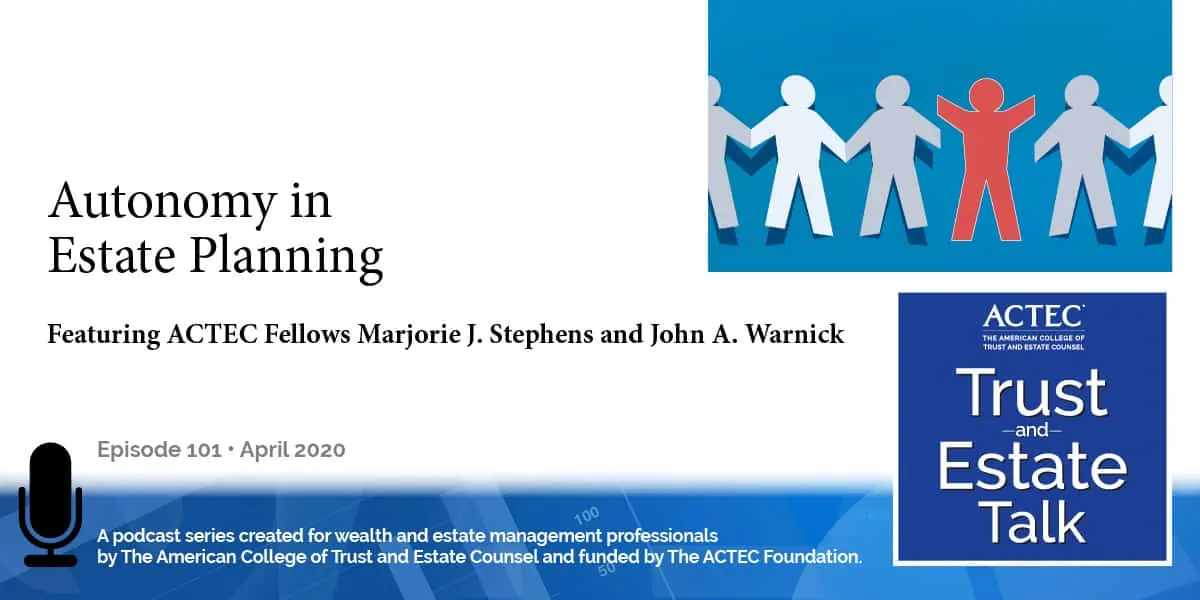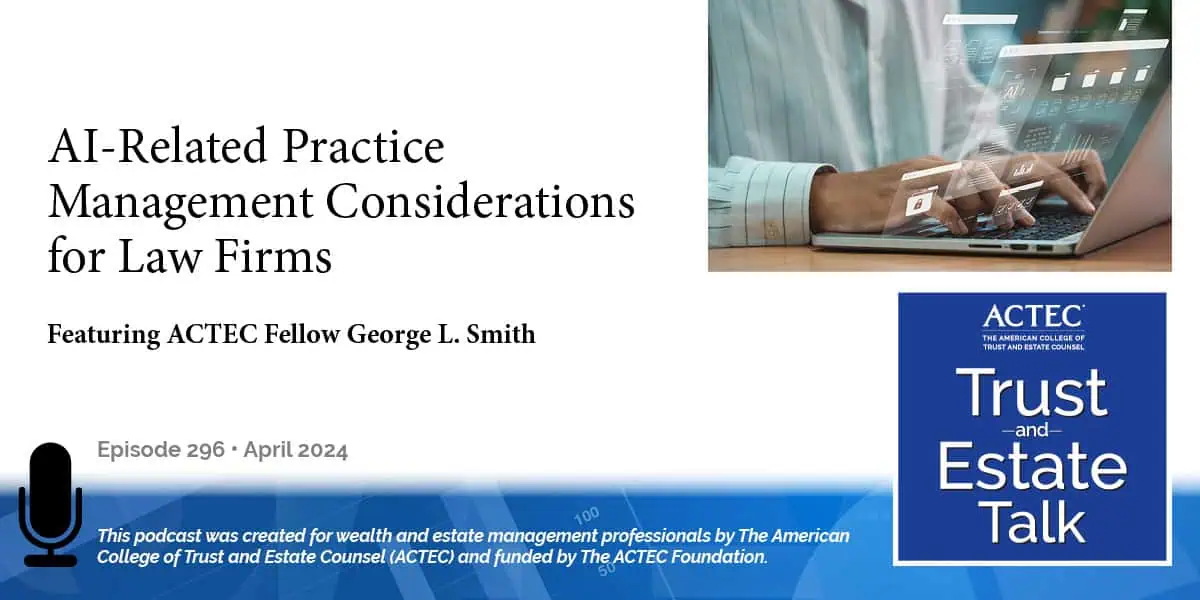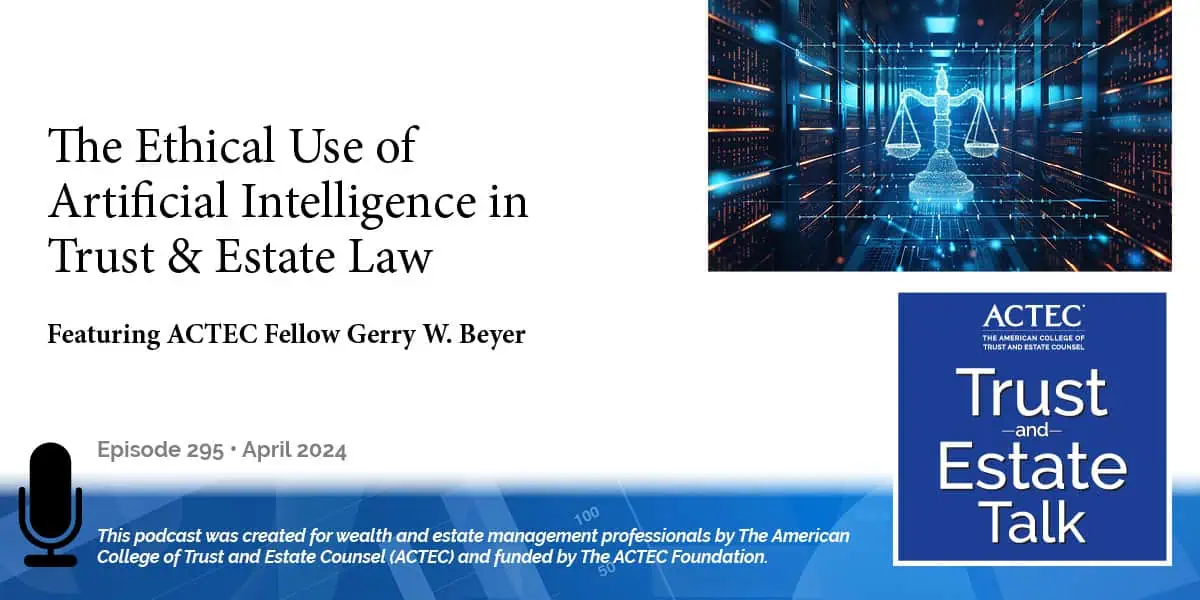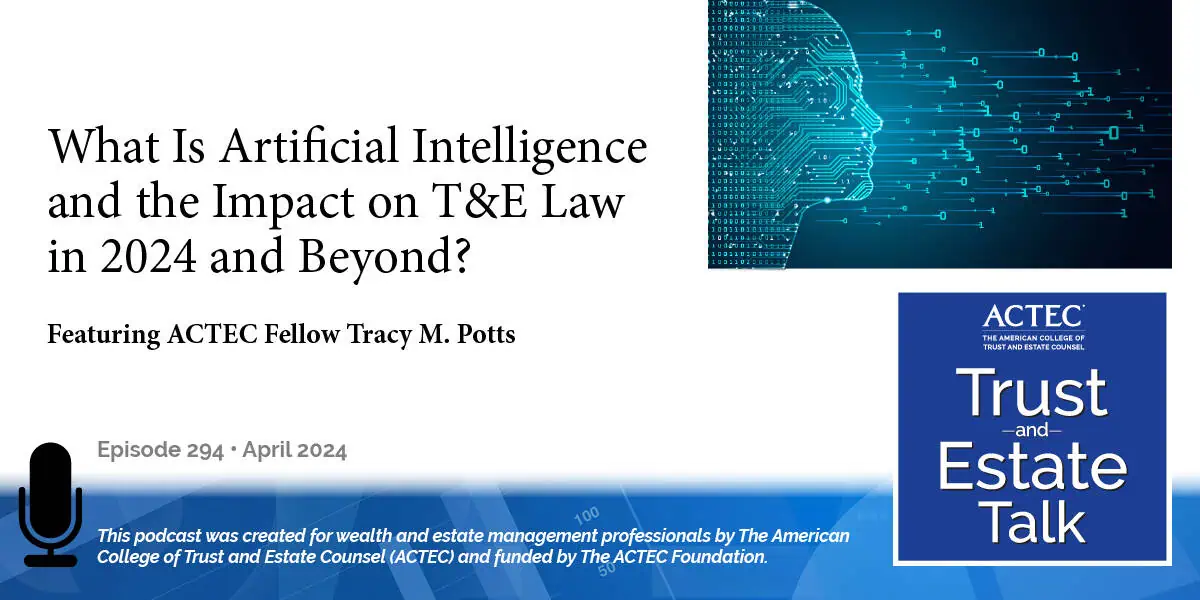Autonomy in Estate Planning

“Autonomy in Estate Planning,” that’s the subject of today’s ACTEC Trust and Estate Talk.
Transcript/Show Notes
This is Stacy Singer, ACTEC Fellow from Chicago. Providing space for autonomy with next generation family members is essential for sustainable estate plans. To give us more information on this topic, you will be hearing today from ACTEC Fellows, Marjorie Stephens of Dallas, Texas and John A. Warnick of Denver, Colorado.
John A., you know, we have been talking about what makes an estate plan productive and what works well on the next generation, and how in the research, Albert Bandura found that what was the best predictor of success and career choice was for the individual to have a high sense of self-efficacy. So that was the perception of the ability to control outcomes in their lives. So really, really, what is happening in this estate planning process – in this maturation process that we are working on with our clients – is the transfer of control from outside the individual to inside the individual. So, we have parents who are developing this estate plan with the objective of having control within the individual. How do you find that works in your practice?
I think, Marjorie, if we think about traditional estate planning, it’s fraught with, really, all sorts of negative structure and influence that interferes with creating space for autonomy; and so most of the estate planning that we do robs beneficiaries of the opportunity to make their own choices. It takes that control and puts it in the hands of the trustee, and it’s very easy for a beneficiary to learn to spell trust by the words mistrust and to feel that I am mistrusted. I wasn’t capable. They didn’t think I could handle it. They were worried that I would blow it. So I think, you know, if we step back and ask what could we do to create more autonomy within estate planning structures, we have to realize that we are starting from an initial kind of starting line with the trust that has a lot of inherent conflict with the desire for and the need for autonomy. So, encouraging the beneficiaries and the rising generation family members to be able to make their own decisions, it may be important that a lot of this take place earlier than when they become even aware of the trust itself.
And John A., have you had any techniques that you have tried, that with any families, that helped move this process forward?
I really think, Marjorie, that opportunity grants are something that I really talk frequently with clients about. An opportunity grant is a way – whether it’s made from a trust or made directly as a gift from parents or grandparents to a child or grandchild – an opportunity grant is creating a financial stipend that will encourage a beneficiary or just a child to create an experience, a learning experience, or it could even just be an enjoyable experience. So the way that this often works is with the 18- to 30- or 35-year-old, his parents will say: sweetheart, here is $5,000, $10,000, whatever the amount is. You have absolute control over deciding where you go, when you go, what you do. There are only two things that we are going to ask of you and that is, at our next family gathering we would like to hear a report around, you know, what you did with your opportunity grant, how you utilized it, and we would like to have you answer two questions. One is, what was the greatest kind of aha or a lesson that this experience brought to you? What was the most valuable thing that you realized or learned as a result of choosing how to spend your opportunity grant? And second, what was it that surprised you most, that was the least expected thing that occurred or that you observed or that you felt while you were exercising your choices and doing your opportunity experience with our opportunity grant? And I have just had amazing results in terms of its, you know, the parents stay out. They don’t go. The child makes all the arrangements – does everything. It’s a great way for them to learn autonomy, exercise control, but to turn it into a positive learning experience.
There are a couple of things that that makes me think about. One of them is, it sounds like the parents are totally without judgment on this.
They need to be.
Yes. That would make all the difference.
Yes. The minute they exercise judgment or discourage or say ‘no, you shouldn’t do that,’ they are defeating part of the purpose.
Another thing it reminds me of, that we haven’t talked about, is there was an article that talked about what amount of money would be life changing. And the individual, the number, the average number that came up was $19,000; which is interesting that you could have that amount of money be life changing because when you were saying this I thought, well, some of these people might really need the money, you know. And see, we are probably talking about a higher income level. But even this was – all the population, $19,000 was life changing. One thing I like about that, I really like about that, as you know, there are people trying to figure out how do we motivate our kids? How do we motivate our kids to the next level, to self-efficacy? And, the things that individuals are automatically motivated to do is toward autonomy, toward mastery, so they could use this to explore, toward purpose, toward relatedness. And if you have the parents in this positive situation and then this bringing it back into the family, that sounds like it would accomplish that. And, has that been your experience?
It has, but what I am loving about this conversation is it’s helping me kind of refine my view of what an opportunity grant might be. And perhaps we want to bring into it, help parents understand that they want to encourage the child to think about possibly one of those four areas as a focus for the opportunity grant experience the child is going to create. So, you know, yes. You have got this money, you decide how to use it, but we would love to have you think about, is it try to find an experience that is going to promote one of these four items.
I love it.
Thank you for giving us more information on autonomy in estate planning.
If you enjoyed this podcast, we recommend
The Intersection of Positive Psychology in Estate Planning
If you have ideas for a future ACTEC Trust & Estate Talk topic, please contact us at ACTECpodcast@ACTEC.org.
© 2018 – 2024 The American College of Trust and Estate Counsel. All rights reserved.
Latest ACTEC Trust and Estate Talk Podcasts

AI-Related Practice Management Considerations for Law Firms
A discussion for law firms about how to incorporate AI in their practice management, including staff considerations, the “billable hour,” and more.

The Ethical Use of Artificial Intelligence in Trust & Estate Law
A law professor offers insights into the risks, rewards, duties and ethical considerations of lawyers using AI in their T&E practices.

What Is Artificial Intelligence and the Impact on T&E Law in 2024 and Beyond?
A primer on the types and uses of AI, then a deeper dive into the impact on trust and estate law from types to applications to ethical considerations.

